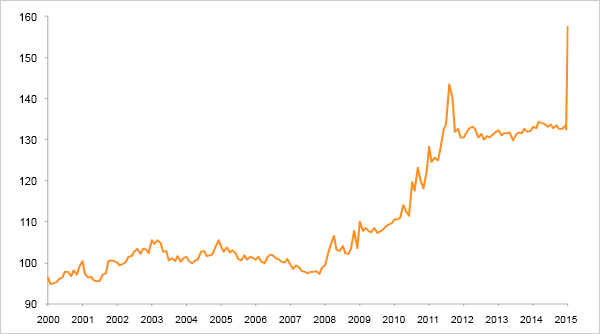The Swiss Surprise
Some thoughts about the Swiss National Bank's decision to abandon the EUR/CHF currency ceiling
1. Clearly, the decision of the Swiss National Bank (SNB) does not indicate great confidence in the prospects for the euro. Abandoning the ceiling of 1 euro for 1.20 Swiss francs also suggests the disappearance of a 'natural' buyer of euros (even though the SNB might intervene periodically in the market to prevent its currency from appreciating too much or too fast). This is likely to strengthen the dollar's ascendancy against the euro.
2. In this respect, it will be interesting to see what the ECB announces this week. Everything points to the ECB steadily embarking on the path of quantitative easing. If this turns out to be the case, the euro will become a weak currency with greater affinity to the currencies of southern countries than to the mark. One by one, the currencies of the leading industrialised countries are losing their value. This will be good for gold.
3. The Swiss franc's appreciation can be considered as a form of monetary tightening and will strengthen deflationary trends. Hence, even if the equity markets outside Switzerland have reacted positively, the SNB's decision is not good news for risk assets, especially as it increases the possibility of an accident in a financial system with very high leverage and in which the prices of many assets are arbitrarily determined by the actions of the central banks (as was the case for the euro–franc exchange rate).
4. The alarmist views currently unfolding on the impact of the Swiss franc's rise on the economy and Swiss companies should be seen in perspective. First, Switzerland is used to living with a strong currency. Since 1970, its exchange rate to the dollar has gone from 0.2 to 1 (before last week's hike). This has not prevented the country from prospering economically and enjoying one of the highest living standards in the world. By encouraging productivity gains, a strong currency creates prosperity, as opposed to a weak currency which is only an easy answer whose economic benefits disappear quickly. More recently, the franc's 30% appreciation between May 2010 and July 2011 before the introduction of the ceiling did not have a lasting effect on Swiss competitiveness, as demonstrated by its enormous current account surplus.
The Swiss franc's performance against the currencies of its principal trading partners

5. For big companies, the short-term impact is generally negative since they generate the great majority of their earnings outside Switzerland. But here again, it is worth remembering that they are used to working with a strong currency. The impact of the franc's sharp rise in 2010/2011 on their earnings was ultimately limited and as soon as the currency ceiling was instituted, their earnings growth broadly surpassed that of most of their European counterparts.In this regard it is also worth remembering that equities represent a long-term investment and that the share price of a company should reflect a discounting of the future earnings that the company is likely to realise over several years to come (and not just for the current year or so).
6. However, the above points do not mean that the fall in Swiss shares represents a strong buying opportunity yet. The Swiss market has risen significantly since 2011 and had become relatively expensive. Despite the fall in recent days, it is still the strongest market since the start of the year in all currencies other than the Swiss franc. We should at least wait until the Swiss franc stabilises.

